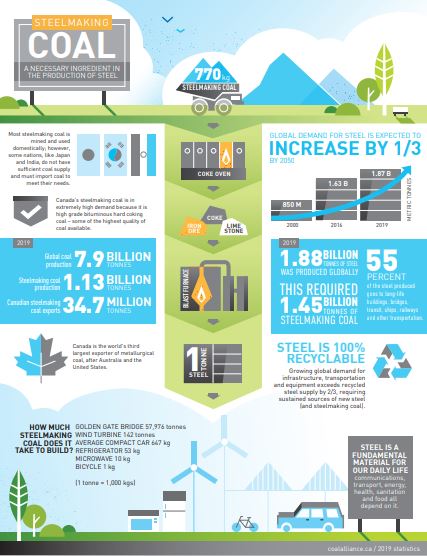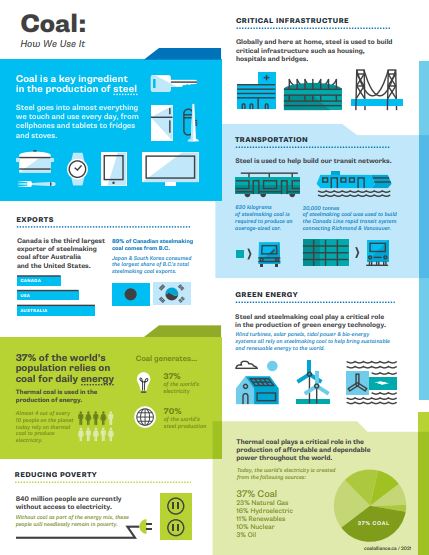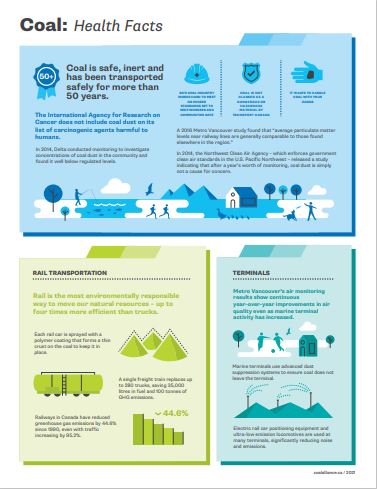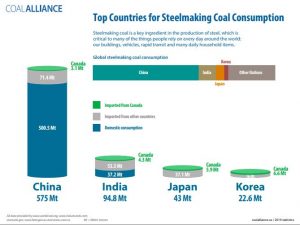Get the facts
1. Coal creates over 26,000 B.C. jobs in mining, transport, equipment and other related sectors.
2. The BC coal industry has spent over $6.8 billion in goods and services over the last five years, and generated millions in public revenues for all levels of government that go to support critical services such as health care and education.
3. Steelmaking coal is a key ingredient in the production of steel, which is critical to many of the things we rely on each day – our buildings, vehicles, rapid transit and many everyday household items.
4. Safe and healthy communities are important for all of us. There is no evidence of health impacts from the mining, transportation or shipping of coal in British Columbia. No one understands that better than the thousands of men and women who work with coal every day.
Powering & Building the World
Globally, coal is an important and necessary resource that provides numerous benefits to the world around us.
Coal a critical element in the production of steel, which is used to deliver the goods and services our societies need and rely on in everyday life – healthcare, telecommunications, improved agricultural practices, transportation networks, clean water and access to reliable and affordable energy.
Steel plays a critical role in green energy production. Whether it is a wind turbine, solar panel, tidal power system or bio-energy infrastructure – it all requires steel. For example, 100 tonnes of steelmaking coal is required to produce the 185 tonnes of steel used in a typical wind turbine. Coal also provides much-needed energy for heat, light and other daily necessities for 37 percent of the world.
Coal is the largest export through Port Metro Vancouver, generating 26,000 jobs across BC and $6.8 billion in economic activity each year. The coal exported from BC is a combination of steelmaking and thermal coal from mines in Canada and the United States. We are proud be an important economic driver in our province.
Safe and Responsible Operations
Here in British Columbia, coal has been safely mined and transported for more than 100 years. The coal supply chain – from mine to railway to export terminal – operates under environmental and safety regulations that are among the most stringent in the world.
Coal is an inert mineral that is safely handled by thousands of workers every day. As part of our commitment to responsible operations, we work to ensure coal remains in the railcars during transport and on the terminal sites.
We have invested tens of millions to enhance the technologies and processes we use to contain coal. This is just one part of our commitment to being a responsible neighbour in the communities where we live and work, where collectively, we donate approximately millions of dollars annually to make our communities stronger.
Transporting Coal
From the mine site to the terminals, we do it safely and responsibly.
Coal and the BC Economy
Our industry supports 26,000 BC families through skilled, highly-paid jobs.
Steel Making Coal
Most of the coal that’s mined in BC is used to make steel.
Thermal Coal
Four out of 10 people on the planet today depend on coal for electricity.
Did you know…?
- Coal is the world’s most plentiful fossil fuel. It is a mineral formed from the remains of land-based plants buried hundreds of millions of years ago and subjected to intense heat and pressure.
- Coal is classified according to the degree of transformation of the original plant material into carbon, moisture content and composition. Today, 6.7 billion metric tonnes of coal is produced each year around the world. Canada’s production is approximately 59.5 million metric tonnes, or 0.88 percent of global production.
- Canada is one of about 24 countries that produces coal. While Canada’s production is relatively small, Canadian coal is highly sought after because of its low sulfur and ash properties, and high caloric value, which makes it a higher quality coal.
- Coal has been mined in BC for more than a century. Today, 10 of the 24 Canadian coal mines are located in BC. The coal mined in BC is steelmaking coal, a key ingredient in the production of steel.
- The coal shipped through West Coast terminals is a combination of steelmaking and thermal coal.
- The majority of Canada’s coal is produced by surface mining. Surface mining is a temporary use of the land with reclamation carried out at the same time mining takes place. Once the resource is mined, it is reclaimed with native trees, shrubs and grasses.
- Coal plays a significant role in the BC economy generating over 26,000 jobs in mining, transport, equipment and other related sectors.
- In BC, the industry generates $6.8 billion in economic activity each year. For more information on the many economic benefits of Canada’s coal industry, go to the Coal Association of Canada’s PwC economic reports – http://www.coal.ca/pwc-economic-report-on-coal/.
How is coal used?
- Coal is a key ingredient in the production of steel. The coal is combined with iron ore under high heat to produce steel.
- Steel goes into almost everything we touch and use every day, from cell phones and tablet computers, to fridges and stoves. Steel and steelmaking coal play a critical role in green energy production since steel is required for wind turbines and solar panels.
- Thermal coal is burned in power plants to produce electricity. Nearly four out of every 10 people on the planet today – most in developing nations – depend on thermal coal to produce electricity – as an affordable and dependable source of power.
- Today, the world’s electricity is created from the following sources:
- 37% coal
- 23% natural gas
- 16% hydroelectric
- 11% renewables
- 10% nuclear
- 3% oil
Safe and Responsible Operations
- Safe and healthy communities are important for all of us. There is no evidence of health impacts from the mining, transportation or shipping of coal in British Columbia. No one understands that better than the thousands of men and women who work with coal every day.
- For over 20 years, health officials have looked at the perceived health impacts of coal transport and have consistently concluded that concerns are unfounded.
- When asked to review more than 54 studies related to coal dust, Dr. Len Ritter, a respected Canadian toxicologist and Professor Emeritus at the University of Guelph found that public exposure to coal bears absolutely no similarity to studies associated with coal mining from decades ago.
- Both steelmaking and thermal coal is made up of approximately 50 metals that are bound (or contained) within the matrix of the coal and cannot be absorbed by the body.
- In early 2013, Delta staff conducted monitoring to investigate the presence of coal dust in the community. Containers were set out in July to collect ambient dust to determine the presence of coal. The sampling results from four different stations in Tsawwassen showed that the incidence of dust fall was very low. One monitoring station alongside the rail track did show a higher level of dust over the course of the month compared to the other stations. Let’s put it into perspective. Of the over two million tonnes of coal transported in 362 trains (approximately 48,870 cars) that passed the test site, a total of 200 mg of coal was measured. This is equivalent to the weight of 20 grains of sand.
- The industry is regulated by no fewer than 10 government agencies responsible for oversight and it adheres to regulatory permits and requirements set by authorities, including federal, provincial, regional and municipal governments and agencies.
Additional Resources




